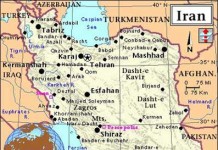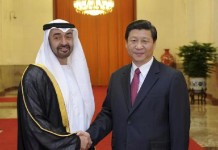Context
 The theory of balance of power maintains that as long as there is stability of power between various international actors, the conduct of international relations would be relatively smoother. However, the present disturbances in this balance have created tremendous turmoil in global politics. Consider, for example, the fast moving change in the Arab world that has completely altered the balance of power in the Middle East. Any sound decision and policy is dependent on conducting a proper and often time-consuming assessment of the situation. However, the world events are moving at such a startling pace that most governments, analysts, and policy makers are at best catching up.
The theory of balance of power maintains that as long as there is stability of power between various international actors, the conduct of international relations would be relatively smoother. However, the present disturbances in this balance have created tremendous turmoil in global politics. Consider, for example, the fast moving change in the Arab world that has completely altered the balance of power in the Middle East. Any sound decision and policy is dependent on conducting a proper and often time-consuming assessment of the situation. However, the world events are moving at such a startling pace that most governments, analysts, and policy makers are at best catching up.
Analysis
The question that is boggling the minds of many a political and business leaders is how to plan in an environment that is increasingly unpredictable. The modern day challenge has shifted from striving for stability and status quo and towards how best to manage change that is constant. It is the business world that provides some of the best methods to deal with change.
The obvious question is; what are the tools and strategies that can help cope with the world of constant flux? Conventional wisdom holds that in the absence of equilibrium in the ecosystem, adaption is the best way i.e., the ones who sense what is changing around them and respond quickly will succeed.
According to an article by John Hagel III, John Seely Brown, and Lang Davison that appeared in Harvard Business Review, titled ‘Shaping Strategy in a World of Constant Disruption,’ changing times present an opportunity to shape the environment. This in business terminology requires learning to shape the instability in the environment by effective management and steering it beyond adaptation to shaping aspiration, and more rewarding future. In other words, this means moving from a reactionary mode of being adaptive to a proactive mode of being a shaper.
To be a shaper, a different kind of leadership and strategy is needed. One example quoted of this in the technology world is how, for example, Bill Gates revolutionized the computer industry in times of immense uncertainty, by having a clear perception on the direction of its future, which Microsoft was itself helping frame. In doing so, Bill Gates not only changed the behaviors of the users towards personal computers but also the entire computer industry. The most crucial element of being a shaper is to be able to envision during times of crisis how the future might look like, and challenging the conventional assumptions about what is needed for success.
What does this business jargon imply for a politician or a political party? It means that a political leader that intends to play a shaping role has to provide a clear direction and focus based on deep insight of the political landscape. Furthermore, it requires altering the risk-reward calculus of the people. This is usually done by a better connection to the aspirations of the masses via a platform, and making it easier and rewarding for them to contribute towards the vision of the shaper. A shaper has to convey to the voters a potential benefit in the future for their contributions, as comparison to the risks if they do not join. The risks for the contributors are not threats, but a feeling of missing the boat. Lastly, a shaper has to demonstrate seriousness and commitment that he/she can reshape the ecosystem, in a way that others will find themselves in a reactive-adaptive mode. In short, the shaper involves the public as a stakeholder in the system. On the other hand, the masses believe that by helping the shaper, they can change their own destinies as well.
Another approach a shaper can employ is to view a given environment via the lenses of the Blue Ocean Strategy of W. Chan Kim and Renee Mauborgne. This method is in contrast to the traditional way of developing a strategy and evaluating a competitive business environment that is based on strengths, weaknesses, opportunities, and threats (SWOT) or Porter’s Five Forces Analysis. Blue Ocean theory alters the landscape based on the discovery of new oceans that the competitors fail to perceive, and thus are compelled to continue challenging each other in the red oceans, while improving only marginally. The basic tenant of what is required for the discovery of blue oceans is structured visualization, and reordering of the existing realities in a fundamental new way.
For example, if political parties of Pakistan keep debating each other and contesting on limited sets of points, their positions at best only marginally improves. This would be called contesting in Red Oceans. None of the parties are looking to alter the order of the existing realities and look at them in a fundamental new way, and thus creating a real opportunity, a key differentiator, and a Blue Ocean. Any political party that successfully accomplishes this will create an unbeatable value in the eyes of the public and an expanding voter bank.
So, adapting may be a useful technique but is not sufficient to deal with change, according to these concepts of the business world. The requirement of taking an initiative and becoming a shaper craves a different outlook. Adapting means reacting to the shifting environment while the shaper alters the ecosystem itself and requires others to adapt, while the ecosystem cannot remain a constant.
For shapers, essential skills include anticipating, critical thinking, creativity and envisioning. Renowned contemporary futurists claim the increasing unpredictability implies the demise of the information age left-brainers and the arrival of the right-brainers. They assert, to deal with non-linearity and chaos of the present day, requires people who can see and synthesize the larger patterns and trends and understand the big picture, or, the holistic view. As oppose to aspiring for the state of stability, shapers have the nerve to strive for the edge of chaos, which lies between the state of order and complete anarchy on a continuum.
Surviving in these turbulent times means mastering the art of managing change. In the emerging world, there is no place for the forces or systems seeking stability or status quo. The choice is either to become a shaper or merely adapt.



